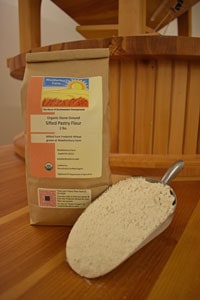Organic Whole & Sifted Pastry Flour
Stone-milled to order at Weatherbury Farm from Organic Frederick Soft White Winter Wheat which is grown on the farm
Stone-milled to order at Weatherbury Farm from Organic Frederick Soft White Winter Wheat which is grown on the farm
Weatherbury’s Organic Whole & Sifted Pastry Flour has a slightly sweet mild delicate flavor which is Unbelievably Tasty!
Great way to punch up the nutrition in cakes, cookies, pastries, pancakes, scones & muffins.
 Milled to order from Organic Frederick Soft White Winter Wheat grown at Weatherbury Farm.
Milled to order from Organic Frederick Soft White Winter Wheat grown at Weatherbury Farm.
Provides a finer texture and lighter consistency with lower gluten than whole wheat bread flour. Ground in one pass and sifted through a very coarse sieve so that any very large pieces of bran and hulls remaining are removed .
Contains the minerals, vitamins, enzymes, amino acids, fiber and oils in the same proportions as they are found in the grain.
This flour is not bleached.
2lbs* ($4.92); 5lbs* ($9.46); 25lbs ($37.83); 50lbs** ($72.74)
 Milled to order from Organic Fredrick Soft White Winter Wheat grown at Weatherbury Farm.
Milled to order from Organic Fredrick Soft White Winter Wheat grown at Weatherbury Farm.
A very silky flour that makes excellent cakes, pastries etc. The germ is still in the flour and actually contributes to the flavor of the cakes, cookies and pastries. Ground in multiple passes and sifted through a fine sieve. Approximately 85% extraction.
This flour is not bleached.
2lbs* ($7.28); 5lbs* ($14.79); 25 lbs ($59.01); 50 lbs** ($113.48)
* 2 and 5 pound bags are packaged in re-sealable bags .
** 50 pound bag cannot be shipped.
One pound of flour equals approximately 3 cups of flour.
Weatherbury Farm’s Frederick Wheat Tracker traces the Frederick Soft White Winter Wheat, which is milled into pastry flour back to the field where it was grown, here at Weatherbury Farm.
Weatherbury Farm is one of a handful of farms that produces local flours (flour milled from grains grown on the farm). But we take it a step further and provide, through our grain tracker, complete traceability — information & pictures of how, when, and where the grain was grown.
Imagine serving a cake (or any other of the delicious possibilities that can be made with Weatherbury’s Pastry Flour) — and one of your guests comments on how delicious it is. You pull out your cell phone and click on Weatherbury’s Frederick Tracker, say “Let me show you how the grain was grown that the flour was milled from.”
Use in: in pie crusts, tarts, pastries, cookies, cakes, quick breads, pancakes, sauces and our award winning cornbread
Our favorite pancake recipe is on the back of whole and sifter pastry flours. Additionally, our recipe book which is included with your first order has more favorite recipes.
And as to taste — cornbread made with Weatherbury’s pastry flour and cornmeal won 1st place in 2021. The cornbread placed at the county fair 6 out of the past 7 years
Both the terrior of the soil and the fact that our pastry flour is stone-milled give the flour its wonderful mild, slight sweet flavor.
Pastry flour is a softer flour that can be substituted quite nicely for all-purpose flour in any recipe where tenderness is the goal, like muffins, cakes, and quick breads. It gives baked goods a light, flaky, delicate flavor.
Add an additional 1 tablespoon of Pastry flour for each cup of all-purpose flour in the recipe.
Using Weatherbury’s Pastry Flour in baked goods, not only enhances the taste but make them more nourishing. One potential drawback is that cakes and cookies made with all-purpose flour will be less tasty as you remembered.
Wheat is an excellent source of protein, dietary fibers, manganese and selenium. Wheat’s fiber boosts the digestive process and improves overall metabolism. The vitamin B content of wheat provides you with energy. Additionally, the complex carbohydrates in wheat keeps you feeling fuller longer and give you energy over a longer period.
Managanese, which wheat is rich in, acts as a co-factor for greater than 300 enzymes involved in the production of insulin and glucose secretion. Wheat’s betaine content prevents chronic inflammation, which is a key constituent in rheumatic pains and diseases. Additionally, its anti-inflammatory property reduces the risk of ailments like osteoporosis, heart diseases, Alzheimer’s disease, cognitive decline, and type-2 diabetes.
And best of all, it tastes great.
There are no preservatives in our flour. Please refrigerate. If you will not be using the flour immediately, please store in the freezer especially in warm weather.
Back in the day, soft wheat was the grain of choice in southwestern Pennsylvania because of our wet weather. In fact, bread was made from soft wheat. Fredrick is a winter wheat developed under the auspices of the Ontario Cereal Crops Committee in 1959, under the supervision of Fredrick Gfeller (hence the name) and licensed in 1971.
Today’s wheat ( Triticum aestivum ) can be traced back to domesticated forms of spelt (T. spelta) . Because spelt does not thresh free from the hull, farmers/ plant breeders in the 1800s selected and planted spelt grains that did thresh free and by continuing to do this over a period of time, a free-threshing wheat developed.
In the early 20th century, the laws of Gregor Mendel were applied to wheat breeding. This produced wheats with a thick bran that were bred to withstand chemical fertilizers, herbicides and pesticides and could stand up as well to the harsh roller milling processing. Because of global market pricing, breeders of this type of wheat strive to have the lowest cost of production possible.
During harvest, the wheat threshes free of the chaff from the grain head and doesn’t require an extra dehulling step like spelt or einkorn. Before milling, the grain is cleaned to remove any chaff, straw pieces or weed seeds.